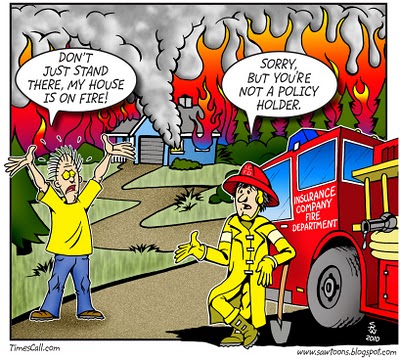 Sam Wallace has created another cartoon about wildland fire. This one refers to the Chubb insurance company sending fire engines to protect the homes of their policy holders during the Fourmile fire last month near Boulder, Colorado. At his web site, Mr. Wallace wrote this about the cartoon:
Sam Wallace has created another cartoon about wildland fire. This one refers to the Chubb insurance company sending fire engines to protect the homes of their policy holders during the Fourmile fire last month near Boulder, Colorado. At his web site, Mr. Wallace wrote this about the cartoon:
This is not a jab at firemen or the fire department. They do a great job. This is for the private fire fighters hired by insurance companies. (Extra special coverage, as long as you have paid for it.) Why would they help, if you were not a policy holder. Some how it does not seem right to me.
Earlier we showed you some of Mr. Wallace’s other cartoons about wildfire. His work appears at the Longmont, Colorado Times Call and at his own web site. The cartoon is published here with his permission.

I talked with some of the folks that operate these engines on a fire in Washington state a couple of years ago, and no they do not actually fight the fire. What they do is spray fire gel on the houses covered by the insurance. When there is a fire near a covered home they go in before they fire gets there and sprays a gel on the house that will keep it from igniting when the fire does roll through. They are well out of the area by that time. Homeowners can purchace the gel themselves and do the same job without having to pay the extra cost of insurance. In fact they can probably get discounts on their homeowners policies for having the gel system already at their homes. The stuff is amazing and everybody in the urban areas should buy 5 gallons of it. Im really surprized that all fire apparatus is not equipped with it, but I guess the costs are way to much for that. It is however cost effective for homeowners.
I am insured with a insurance company that offers this service to thier clients if they are in a particular area and not of all there clients are eligible to receive this service. One of my homes get this service and ones does not. Anyway, they have told me that they do not put fire out, only prevention. If they come upon my house and it is on fire, they have to call 911 and they do not attempt to put it out. They are not equipped to do that and they have to leave that to the firefighters. They have explained that the will try to get to my house is the local fire fighters grant them access and it is safe for them. They try to stay way ahead of the fire to try to foam it or do whatever they can to prepare the house to withstand the approaching wildfire.
I must disagree with Sam Wallace: why should a private business take actions that they are not being reimbursed for? This is simply a business decision, and there are both economic and liability issues involved. Bottom line: if members of a fire-prone community want a higher level of protection for their homes from wildfires, they should pass taxes and pay for it. Otherwise, businesses like the insurance industry will step up and provide a level of service/protection that government does not.
Spoken like someone who’s never been on the fire line, and who’s never been bumping and running from house to house trying to save an entire nieghborhood, if those resources are there and the IC knows about them, they should be put to use.. It’s like them pulling up to one of our water tenders and us telling them no way, go get your water someplace else..
Chris – I believe that there is a real difference between the responsibilities and obligations of the Public and Private sectors; the Public is paid for by the citizens for the Common Good, whereas the Private sector is paid for by the customer to provide the goods and services they demand. There is a lot of investment to start a fire company like those contracted by Chubb Insurance, and no Public $$ went towards that investment. Now, after the $$ are invested and the resources are ready to do the mission they were hired for, the “Public” should use them if they wish?
We have lots of multi-Agency fires in the West where the “you order, you pay” philosophy is implemented, and the poorer States and Counties are often reluctant to order Federal aviation resources like air tankers because of the costs; is there a difference with the private engines? And lets get beyond structures: how about valuable private timberlands being protected by Company resources: should a government agency be allowed to divert them to a mission they deem more pressing, even if it meand the potential loss of that private timber?